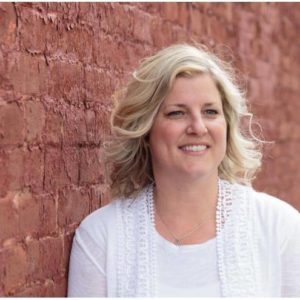 This is the first in a series of posts featuring reflections from participants at the 2018 Women Doing Theology conference organized by MC USA’s Women in Leadership.
This is the first in a series of posts featuring reflections from participants at the 2018 Women Doing Theology conference organized by MC USA’s Women in Leadership.
Chris Hoover Seidel is a spiritual director and the director of Bridge of Hope Harrisonburg-Rockingham. She is a graduate of Lancaster Theological Seminary and attends Community Mennonite Church in Harrisonburg, Virginia, where she lives with her family. Her work, “Sophia at the Crossroads: Dismantling Patriarchy in the Church through the Biblical Goddess,” was published in January in I’ve got the power, a collection of essays based on presentations at the 2016 Women Doing Theology Conference. To learn more about Chris’ work, visit www.soulence.space.
Three incredible days of worship, plenary sessions, workshops and paper presentations. Women in Leadership’s 2018 Women Doing Theology Conference, Talkin ‘Bout a Revolution, modeled what can happen in the Mennonite Church when voices of women of color and queer folx are centered: abundance of radical love, wisdom and courage calling us all to a new reality.
Ever since Linda Sarsour, one of the organizers of the Women’s March on Washington declared, “Follow women of color, because they know how to work for justice for ALL people,” I have made this my mantra. What this has meant for me is to be willing to practice de-centering white women, including myself.
I will be the first to admit that being a white woman committed to dismantling white supremacist patriarchy requires some careful navigation. When do we sit down? When do we stand up? When are we silent? When do we insert our voices? I’ve been called out along with other white women for not stepping up for our sisters of color when it was our work to do.
There’s certainly a discomfort there, but I choose to think of it as a snake shedding her skin — being called out of the old and into the space where something new must grow. It’s a necessary discomfort, and it’s my heart’s desire for something new to grow, especially in the church.
So I have to practice comfort with discomfort, one of five intentional community commitments that shaped the conference.
I write this because I know some white women are struggling with questions about what a revolution might mean for them. I want to take time to sit with that question and really examine the root issues that are hidden beneath it. Alanis Morrisette’s song, “Sister Blister,” came to mind as I sat reflecting on these dynamics.
You and me estrange-ed from the mother
You and me have felt impotent in our skin
You and me have taken it out on each otherYou and me disloyal to the feminine
Such a pity to disavow each other
With how far we’ve come
With how strong we’ve beenAnd you and me are on this pendulum together
And you and me with scarcity still fuelingSister blister we fight to please the brothers
We think their acceptance is how we win
They’re happy we’re climbing over each otherTo beg the club of boys to let us in
At the conference, the centered voices of women of color and queer folx amplified the hopeful common theme of Linda Sarsour’s message: There is room at the table for ALL of us. During her plenary session, Rev. Yvette Blair stated, “If I get in the door, I’m taking the hinges off, so you can come in too.” With that as our starting point, how can we go wrong? But this is where white feminists have failed. We have not sufficiently embraced intersectionality to include all who reside on the margins. Many of us have been so occupied with finding our way to the center, that we have ignored the doors swinging shut behind us. This reality is one ultimately shaped by patriarchy and internalized misogyny. And it’s tragic. It’s something white women need to lament. It’s part of our history, whether we like it or not.
The truth, as women of color have pointed out, is that both death and life, despair and hope are on the margins, and it’s not a place to run away from. Can we recognize “the center” as a colonized space? Can we move away from “center” as destination and practice it as action?
Women of color are fluent in survival. They know what is needed to move forward. The question is “Are we willing to do our transformation work?” Practicing comfort with discomfort, de-centering our egos, and actively transforming is the way to overcome white fragility and remain relevant to the movement.
As I sat with other white women in a conference-designated Whiteness Accountability Space, one woman asked me how I hold together being my full-self and being de-centered as a white woman. In my response, I borrowed a line from a quote by Murri activist Lilla Watson.
“If you have come here to help me, you are wasting your time. But if you have come because your liberation is bound up with mine, then let us work together.”
 As white women, we can recognize that the long journey of reclaiming our bodies, voices and agency is not lost when we step aside to make room for others.
As white women, we can recognize that the long journey of reclaiming our bodies, voices and agency is not lost when we step aside to make room for others.
We can recognize that this is a vital part of a new way of being, where we aren’t just changing the hierarchy, we’re altogether subverting it. That is the way of the Divine Feminine, and it pours forth abundance! Our liberation is absolutely bound up with our sisters of color and all who reside on the margins. Our liberation is bound up with every living thing! Living fully into our agency, calling forth our truest, most authentic selves anchored in the radical love of the Divine, is not separate from this vision, it’s the way we help to make it reality. It’s also an invitation to shed white supremacist obsession with perfection. This is messy work. But no woman I know is a stranger to messiness. It requires us to outgrow our internalized misogyny that says we are not enough, and we have nothing to contribute.
We are absolutely chosen to sit at the table. This table is where our sisters of color hold the chalices, and as we dip our corn tortillas in the wine, they offer the blessing, “Welcome to the revolution.”
______________________________________________
Find out more about the work of MC USA’s Women in Leadership and contribute towards projects like Women Doing Theology here.

